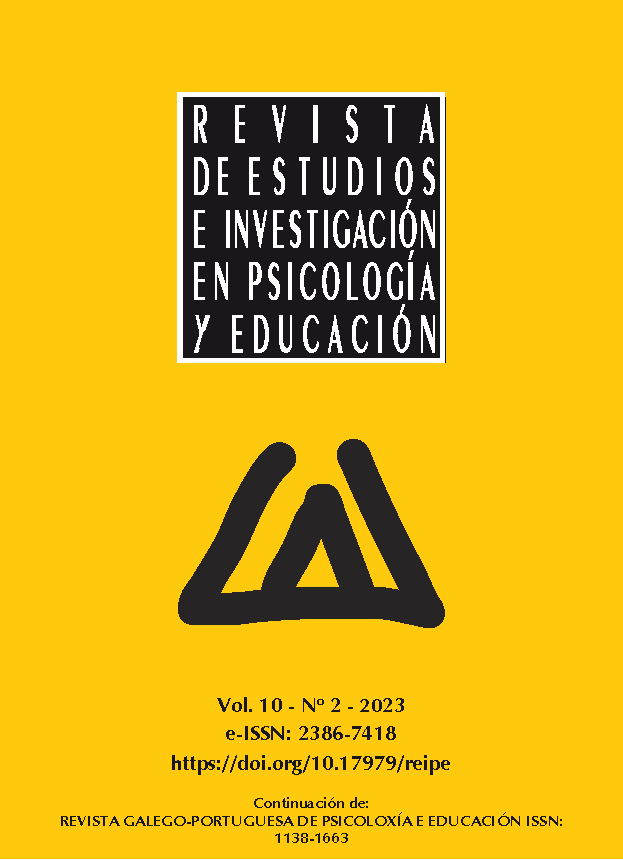Análisis factorial confirmatorio del test de lenguaje oral y escrito LolEva para edades de 3-6 años
Contenido principal del artículo
DOI:
https://doi.org/10.17979/reipe.2023.10.2.9794Resumen
La prueba de evaluación de la conciencia fonológica (CF) y la competencia lectora inicial (CLI) LolEva, es un instrumento informatizado dirigido a identificar la existencia de problemas en el desarrollo de habilidades que pudieran conllevar dificultades en el aprendizaje de la lectura. Los análisis precedentes de sus propiedades psicométricas con una muestra entre los 3 y los 8 años de edad mostraban una alta fiabilidad, buena discriminación de los ítems, así como la presencia de tres factores que explicaban un 75% de la varianza: rendimiento en CF, CLI, y tiempos de lectura de palabras. Con los resultados obtenidos en una muestra posterior de 343 niños y niñas de 3 a 6 años escolarizados en centros públicos y concertados, se sometió el modelo resultante a un análisis factorial confirmatorio (AFC). Sus resultados aportan evidencia en apoyo de la fiabilidad y validez de constructo de la prueba y apoyan la relación de continuidad entre el desarrollo de la conciencia fonológica y el aprendizaje lector.
Palabras clave:
Descargas
Detalles del artículo
Referencias
AGUILAR, Manuel; MARCHENA, Esperanza; NAVARRO, José Ignacio; MENACHO, Inmaculada; & ALCALDE, Concepción (2011). Niveles de dificultad de la conciencia fonológica y aprendizaje lector. Revista de Logopedia, Foniatría y Audiología, 31(2), 96-105. https://doi.org/10.1016/S0214-4603(11)70177-2
DEFIOR, Sylvia; & SERRANO, Francisca (2011). La conciencia fonémica, aliada de la adquisición lenguaje escrito. Revista de Logopedia, Foniatría y Audiología, 31(1), 2-13. https://doi.org/10.1016/S0214-4603(11)70165-6
GUTIÉRREZ, Raúl (2018). Efectos de la lectura compartida y la conciencia fonológica para una mejora en el aprendizaje lector. Revista Complutense de Educación, 29(2), 441. https://doi.org/10.5209/RCED.52790
GUTIÉRREZ, Raúl; & DÍEZ, Antonio (2017). Efectos de un programa de conciencia fonológica en el aprendizaje de la lectura y la escritura. Revista Española de Orientación y Psicopedagogía, 28(2), 30-45. https://doi.org/10.5944/reop.vol.28.num.2.2017.20117
GUTIÉRREZ, Raúl, & DÍEZ, Antonio (2018). Conciencia fonológica y desarrollo evolutivo de la escritura en las primeras edades. Educación XX1, 21(1), 395-416. https://doi.org/10.5944/educxx1.20212
GUTIÉRREZ, Raúl; DE VICENTE, María Isabel; & ALARCÓN, Rafael (2020). Desarrollo de la conciencia fonológica en el inicio del proceso de aprendizaje de la lectura. Revista Signos, 53(104), 664-681. https://doi.org/10.4067/S0718-09342020000300664
JIMÉNEZ, Juan Eugenio; & GARCÍA, Eduardo (2012). Evaluación asistida a través del ordenador en la dislexia. En Juan Eugenio Jiménez (coord.): Dislexia en español: prevalencia e indicadores cognitivos, culturales, familiares y biológicos (pp. 212-235). Pirámide.
MAYOR, María Ángeles; FERNÁNDEZ, María Luz; TUÑAS, Alejandro; ZUBIAUZ, Begoña; & DURÁN, Montserrat (2012). La relación entre funciones ejecutivas y conciencia fonológica en educación primaria. En Lourdes Mata, Francisco Peixoto, José Morgado, José Castro y Vera Monteiro (eds). 12° Colóquio Psicología e Educaçao. Educaçao, aprendizajem e desenvolvimento: olhares contemporâneos a través da investigaçao e da prática (pp.1792-1806). ISPA, http://hdl.handle.net/10400.12/5184
PERALBO, Manuel; MAYOR, María Ángeles; ZUBIAUZ, Begoña; RISSO, Alicia; AMADO, María Luz; & TUÑAS, Alejandro (2015). The loleva oral and written language test: Psychometric properties. The Spanish Journal of Psychology, 18, 1-12. https://doi.org/10.1017/sjp.2015.15
PÉREZ, María; & GONZÁLEZ, María José (2004). Desarrollo del conocimiento fonológico, experiencia lectora y dificultad de la tarea. Revista de Logopedia, Foniatría y Audiología, 24(1), 2-15. https://doi.org/10.1016/s0214-4603(04)75770-8
TOURÓN, Javier (Ed.); LIZASOAIN, Luis; NAVARRO, Enrique; & LÓPEZ, Emelina (2023). Análisis de datos y medida en educación. Volumen 1. UNIR Editorial.
TREIMAN, Rebecca; & ZUKOWSKI, Andrea (2001). Levels of phonological awareness. En Susan A. Brady y Donald P. Shankweiler (Eds.), Phonological processes in literacy. A tribute to Isabelle Y. Liberman (pp. 67-83). Routledge.



